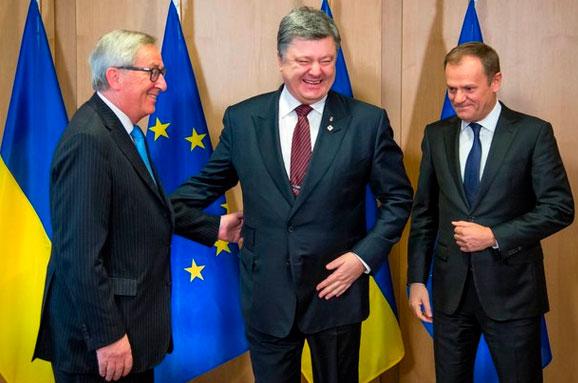Ukraine’s President Petro Poroshenko expressed guarded optimism Thursday that a U.S. administration under president-elect Donald Trump will continue to back sanctions against Russia.
At a summit with top European Union officials in Brussels, Poroshenko said Trump had raised the annexation of Crimea and the conflict in the east of Ukraine in a conversation with him.
“I had an opportunity to give him very detailed information about the latest situation in the east of my country and Crimea,” Poroshenko told reporters.
He said Ukraine has strong bipartisan support in the United States and “we don’t expect any changes.”
European Council President Donald Tusk said the future U.S. leader also made “very generalized” comments about Ukraine in their telephone chat. Tusk said the conversation was short on details “but at least promising compared to some announcements during the campaign.”
EU member countries were rattled by Trump’s generally benevolent view of Russian President Vladimir Putin during the election campaign.
The EU imposed a series of rolling economic sanctions against Russia in July 2014. They include diplomatic measures including canceling top-level meetings, and travel bans and asset freezes on people linked to the annexation of Crimea or believed to be interfering with Ukraine’s territorial integrity.
Some of those measures are due to be renewed in January, but EU officials have been waiting to get a clearer picture of whether Trump plans to reboot relations with Russia. With the EU already divided over how to handle Moscow, any sign that U.S.-Russia relations might improve could undermine the sanctions regime.
Poroshenko’s trip to Brussels was in part to lobby the EU to continue the restrictive measures and urge Washington to do the same.
Tusk underlined that the Russia “sanctions remain clearly linked to the complete implementation” of the Minsk peace agreement that was meant to have ended the conflict. For the moment at least, they still do not believe that Putin is doing enough.
Thursday’s summit was held three years after the Maidan popular uprising in Kiev. The protests were set off in November 2013 when then-President Viktor Yanukovych abruptly decided to abandon a free-trade agreement with the EU and seek closer cooperation with Moscow instead.
Hundreds of thousands of Ukrainians took to the streets. The protests later turned violent, with more than 100 people killed, many of them by sniper fire.
The Brussels summit was also an occasion for EU officials to keep pressure on Poroshenko to push forward with democracy and rule of law-oriented reforms and battle corruption.
The EU has committed almost 3.5 billion euros ($3.7 billion) to Ukraine over the past two years. It also launched a mission aimed at chaperoning the former Soviet Republic toward democracy.
But endemic corruption has undermined progress. Two high-profile reformist politicians resigned early this month in frustration.
Tusk also said Ukraine has met all the conditions to receive visa-free travel in Europe for its citizens and that he hopes the visa waiver can be granted by the end of the year.
The Associated Press by Lorne Cook





